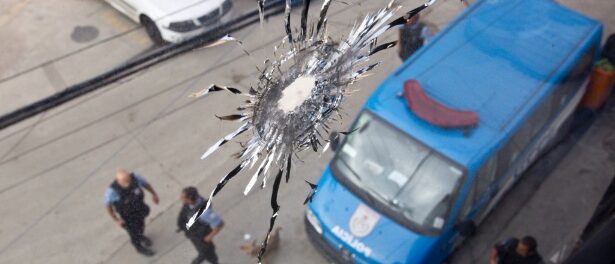
For the original article by Paula Bianchi in Portuguese published by UOL Notícias, click here.
Nearly ten years since its creation, the Pacifying Police Units (UPP) project is almost on its knees. With 38 units in different communities across Rio de Janeiro and around 10,000 officers, the program is facing criticism from residents, reports of police abuse, and a lack of resources. Among the ten neighborhoods of Rio with the most shootings, eight are occupied by the police.
According to the study, “UPP: Last Call—Views and Expectations of Residents of Favelas Occupied by the Military Police in the City of Rio de Janeiro,” carried out by the Cândido Mendes University’s Center for Studies on Security and Citizenship, 66% of residents think that the UPP program is a “flawed project.” At the same time, 59.7% support the continuing police presence provided some changes are made.
The majority of residents who want the UPPs to stay live in favelas in the South Zone, are white, are 35 years old or older, and have never been searched by police. Among the 35.4% who wish to see the Military Police leave their communities are many respondents who live in the West Zone and have had their homes raided by police.
The study also highlights the indifference reported by residents with regard to the benefits of the UPP program. When asked about the negative and positive aspects of police occupation, between 55% and 68% said that UPPs “didn’t make a difference.”
For the researchers, the current shortcomings of the UPPs “reinforce the feeling that the project was designed to last until the end of the Olympics and that the policy of confrontation, reinforced by the ‘war on drugs’ rhetoric, would return to once again be the tonic for public security policy in the State,” as opposed to the idea of proximity policing that the UPPs embraced initially.
The main positive aspects mentioned by residents were access to public and private services, infrastructure works, social projects, and the freedom to come and go. The main negatives mentioned were increases in rental prices, robberies, muggings and rapes, and, in particular, shootings.
A survey carried out by UOL based on data from Amnesty International’s Fogo Cruzado (Crossfire) application showed that since the beginning of the year, at least one person has died every two days as a result of armed conflict in police-occupied favelas.
“Before, you used to know when there would be a shooting, when there was an operation or something like that. Now, you don’t know. You go out and you don’t know if you’ll be able to come back… [Before,] when the police came in, people knew they were coming so we stayed inside as the best way to protect ourselves. Now with the UPP, we can’t. We’re always running a risk. I go to buy a loaf of bread in the bakery and a shooting can start out of nowhere,” said one surveyed resident of a favela with a UPP.
According to the researchers, there is a demand for returning to the original aim of the UPP program. According to the study, residents are calling for greater proximity policing in which they—the residents—are seen as “facilitators of and contributors to the public policy implemented in the favelas.”
“For a long time, the evaluation of the success of UPPs has concentrated on the control of territories, the reduction of lethal violence, and the reduction of shootings, leaving the necessary institutional reform of policing as secondary,” said Leonard Musumeci, one of the coordinators of the research.
Public Security Secretary Roberto Sá recently recognized that the UPP project was a “daring” attempt but that it does need reform.
In an interview on Monday, August 21, when an operation coordinated between the police and armed forces saw 39 suspects arrested across seven communities but left almost 27,000 students in the North Zone unable to attend school, Sá affirmed that the public needs to support the UPPs, despite the problems encountered in the areas where they are based.
“We acknowledge that it’s not having the same results as in 2008 and 2009. The UPP program, even with its problems, does deserve support. It is our duty not to give up. If crime increases in your area, you will call for the police rather than there just not being any police. Soon, we will announce what we will do with the UPPs and policing,” declared the Secretary.
The survey was conducted with 2,479 residents from police-occupied favelas in all parts of the city between August and October 2016. The margin of error is 4%.
